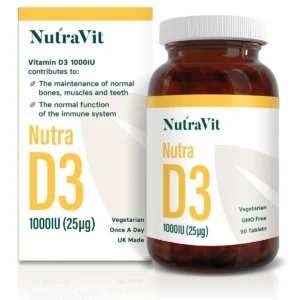Do you still need a vitamin D supplement in the summer?
Summer sunshine is a great natural source of vitamin D, but that doesn’t mean everyone gets enough of it. Factors like sunscreen, limited sun exposure, age, skin pigmentation, and indoor lifestyles can all reduce your ability to produce this vital nutrient, even in summer. In this guide, NutraVit explores whether you still need a vitamin D supplement during the warmer months, how much sun exposure is really enough, and what role supplements can play in supporting your immune system, bones, and energy. Find out how to strike the right balance and make the best choices for your summer health.
Summer brings longer, brighter days and more opportunities to enjoy the great outdoors. And with the sun shining, it’s easy to assume that vitamin D supplements can take a back seat. After all, isn’t sunshine the best source of this essential nutrient?
While sunlight does play a vital role in vitamin D production, whether you still need a supplement in summer isn’t a simple yes or no.
In this guide, we explore the relationship between sunshine and vitamin D, what affects your ability to absorb it, and whether supplements should remain part of your summer wellness routine.
How does the body make vitamin D from sunlight?
Vitamin D, often referred to as the “sunshine vitamin,” is produced when your skin is exposed to UVB rays from the sun. These rays interact with a compound in the skin, eventually converting into the active form of vitamin D used throughout the body.
Vitamin D is crucial for:
- Calcium absorption – supporting strong bones and teeth
- Immune system function – helping defend against infections
- Muscle strength – improving physical coordination
- Cell growth and repair – supporting overall wellbeing
Can you get enough vitamin D from sunlight alone?
Many people assume that summer sunshine is enough to meet their vitamin D needs, but that’s not always the case. Several common factors can reduce how much vitamin D your body produces, even in the sunniest months:
- Sunscreen use: SPF blocks UVB rays, which reduces vitamin D production.
- Indoor lifestyles: Office jobs, commuting, and indoor hobbies all limit exposure.
- Clothing coverage: Wearing hats or long sleeves keeps UVB from reaching the skin.
- Time of day & geography: UVB is strongest between 10 am–3 pm from late March to September in the UK.
- Skin pigmentation: Darker skin needs more sun to produce the same amount of vitamin D.
- Age: Older adults produce less vitamin D through sun exposure.
- Health conditions: Certain conditions affect how vitamin D is absorbed or processed.
Should you take vitamin D supplements in the summer?
Due to these lifestyle and biological factors, many people may still struggle to get enough vitamin D from sun exposure alone, even during summer. That’s where supplements can offer a simple, effective solution.
At NutraVit, our high-quality vitamin D supplements are designed to help you maintain optimal levels year-round. Supplementation is especially important if:
- You have limited sun exposure
- You have darker skin
- You’re over the age of 65
- You wear sunscreen consistently
- You have an underlying health condition
NHS and global health guidelines often recommend daily vitamin D intake of 10 micrograms (400 IU) for adults, something that’s not always achievable through sunlight and food alone.
How can NutraVit support your vitamin D needs?
The decision to supplement during summer should always be tailored to your individual needs. Speaking with a healthcare professional and getting a blood test is the most accurate way to determine if you’re deficient and need a supplement, regardless of the season.
At NutraVit, we take a balanced approach:
- Sensible sun exposure
- A diet rich in vitamin D sources (like oily fish and fortified foods)
- Supplementation when needed
Explore our range of high-quality vitamin D supplements to help fill nutritional gaps and support immune health, bone strength, and energy levels, whatever the weather.
Final thoughts
Vitamin D plays a vital role in your overall health and, while the summer sun helps, it doesn’t always guarantee enough. Whether due to your lifestyle, skin type, or health needs, taking a supplement during summer may still be a wise choice.
At NutraVit, we’re here to help you make informed wellness decisions with supplements you can trust. Explore our full range of immune and vitamin D support products.
Your Questions Answered
I spend a lot of time in the sun. Can I skip my vitamin D supplement in summer?
Not necessarily. Factors like sunscreen, skin type, and clothing can still limit your vitamin D production, even with frequent sun exposure.
How much sun is enough to get vitamin D in the summer?
It depends on the individual, but for fair skin, 10–15 minutes of sun exposure on bare skin (without sunscreen) a few times a week during peak hours may be enough, though this varies based on age, location, and skin tone.
Does wearing sunscreen completely block vitamin D?
Sunscreen (SPF 15 or higher) can reduce vitamin D synthesis, but most people don’t apply it perfectly, meaning some UVB still reaches the skin. It’s about balance, protect your skin while being mindful of your needs.
Should I get tested for vitamin D in the summer?
Yes. A blood test is the best way to determine if your levels are optimal and whether supplementation is necessary.
 FREE UK DELIVERY ON ORDERS OVER £20.
FREE UK DELIVERY ON ORDERS OVER £20. WORLDWIDE SHIPPING AVAILABLE
WORLDWIDE SHIPPING AVAILABLE

